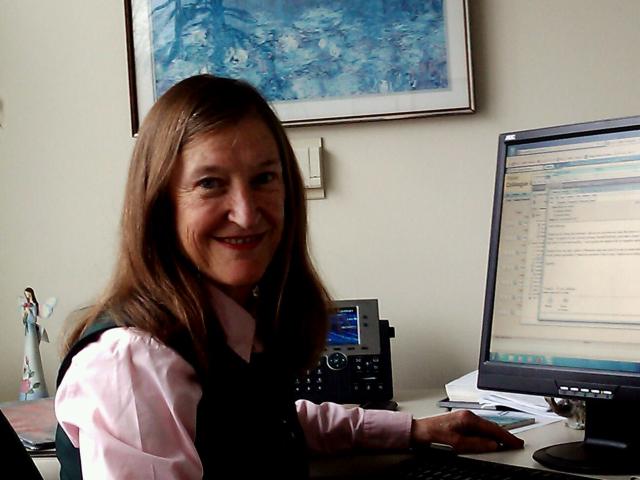Seven (7) Questions: There to Here – Maureen Webster, Ph.D.
Gallery

Maureen Webster, Ph.D. is an exceptional person and someone that I fortunately have as a colleague in the Counseling and Advising Department. Maureen has provided Henry Ford College with more than thirty years of dedicated service as counselor and Coordinator of Adult Learning Services. Maureen is a person whose whit and kindness is great and generous.
Maureen’s educational experience is what is described as traditional. A traditional student typically is one who graduates from high school and goes directly to college at a four year college/university and lives on campus. Dr. Webster’s primary and secondary education prepared her well for college at any university. Maureen shares, though well prepared, she faced challenges of managing “academic rigors” of college. As noted in the Glossary of Education Reform, “In education, rigor is commonly applied to lessons that encourage students to question their assumptions and think deeply, rather than to lessons that merely demand memorization and information recall.” I share this because academic rigor is often the turning point for many students.
It is important to understand as a student that part of learning is critical thinking, to exam closely and analyze the information you receive in a course. I have had students who express concern that “the course or the teacher is too hard”. The student is ready to drop a course because the rigor of the course is challenging. But when you are challenged, it means you are learning a new skill or a set of knowledge. So, when you are challenged in a course this is the time to allocate more time to your studies and seek assistance from your instructor or tutor.
I hope you enjoy reading about Maureen’s story and it encourages you now to endure the academic rigors of college in your college experience. Enjoy!
- What degrees have you earned to date?
- As a Counselor at Henry Ford College what are your responsibilities?
- As an undergraduate student, what was your experience like?
- What was the most difficult challenge you faced while in college and how did you manage it?
- What do you believe are the rewards of your education?
- Did and do you have mentors in your life?
- In giving advice to students regarding pursuing their dreams, what role do you believe charity, gratefulness, self-determination and forgiveness play in the success of a person’s educational pursuits and a productive life?
Ph.D. Counseling University of Michigan – Ann Arbor
M. A. Counseling
B. S. Education (Special Education K-12, Elementary Education K-8) UM AA
Additional Coursework: Wayne State, Michigan State, Eastern Michigan, and University of Edinburgh, Scotland
As a counselor in the Assisted Learning Services Office, I team up with staff who provide accommodations for students with disabilities. The services range from interpreters for the deaf to software for the visually impaired, and are tailored to make education more accessible. Additionally, I provide academic advising, career exploration, and personal counseling. I also participate on a number of College committees and advocate for the disabled.
Coming from a small conservative high school, Dearborn Divine Child, to a large diverse and politically active university in Ann Arbor, University of Michigan was eye-opening and exciting. However, the large classes and academic rigor were challenging and sometimes overwhelming. I had to learn to ask for help and visit my teachers during their office hours. Once I selected my major, the class sizes dropped from about 200 to a more manageable 25, and the teachers were more approachable and helpful.
Being away from home and living on my own required me to balance my academics and personal life. It took me awhile to learn how to study in college, use my free time wisely, and set priorities. Once I decided upon my major, I had a clearer goal and a more focused course of study. Counselors, teachers, and family helped me to find this path.
My education not only taught me skills for my career but familiarized me with other cultures, attitudes, and opinions. I realized there were many ways to approach a challenge and a variety of ways of resolving it. I gained a greater appreciation of the diversity of thoughts and preferences.
I have been blessed to have mentors who have guided me throughout life. They include: my family, teachers, counselors, friends, and kind people who have taken the time to support and encourage me in my endeavors. Without them, it would have been far more difficult to achieve my goals. I am deeply grateful to them.
All of those characteristics combine to form a well-integrated personality, capable of coping with the inevitable stressors in life. For example, a charitable student would offer to help other students who were struggling in class. She would be grateful for her gift of understanding the class work and would be determined to excel in that class. She would forgive others who envied her talent and possibly identified her as a nerd.
The Golden Rule of doing unto others what you would like done unto you includes showing kindness to everyone, not just the pleasant ones; being grateful for your blessings, despite hardships; demonstrating self-determination, in light of obstacles; and forgiving others who don’t understand you or agree with your pursuits. Although these rules aren’t always easy to apply, they work in achieving your educational goals and building a satisfying and productive life.
Thank you, Dr. Webster, for sharing your wonderful story.
